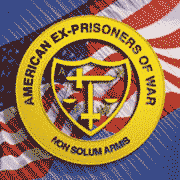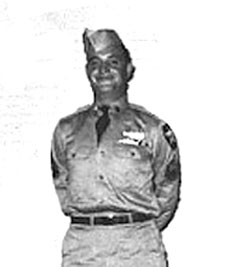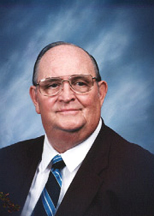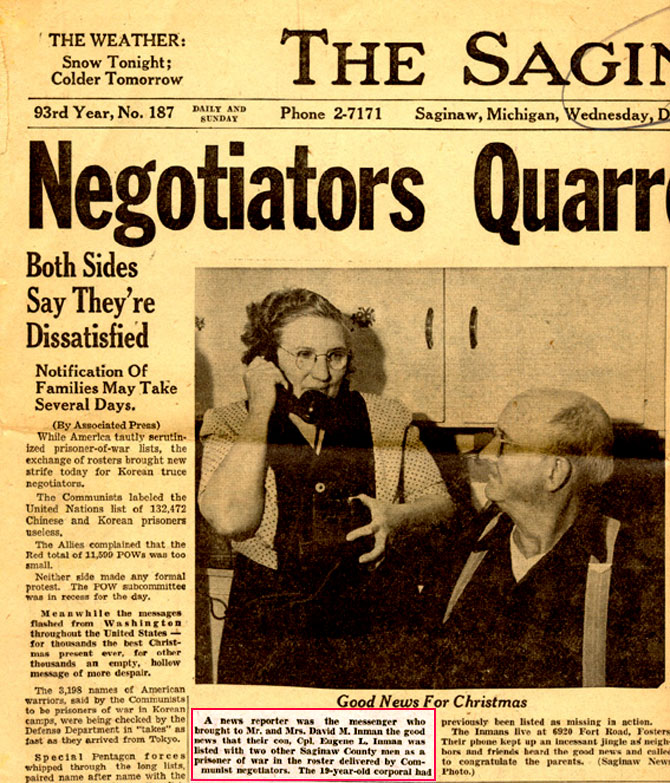
Established April 14, 1942
 |
American Ex-Prisoners of War
A not-for-profit, Congressionally-chartered veterans’ service organization advocating for former prisoners of war and their families.
Established April 14, 1942 |


Cpl Eugene Inman |

Eugene L. Inman, post-Korea |
 Eugene L. Inman |
| Last Name | First Name, Middle Init. | Nickname |
| Spouse | City | State, Zip |
| Conflict | Branch of Service | Unit: |
| Military Job | Date Captured | Where Captured |
| Age at Capture | Time Interned | Camps |
| Date Liberated | Medals Received | |
| After the War ... | ||
I served with the Army's 2nd Infantry Division, 9th Infantry Ret. I saw action in various parts of Korea from the Naktong River Line in last of July-Aug. 1950 as a member of an RCT plugging holes here and there under highly stressed and traumatic scenes until Chongchon River Line in November 1950.
The early activities in July were struggles to beat back probing and breakthrough efforts of the Koreans. Then my capture running the gauntlet at the pass in the Kunu-ri-Sunchon roadblock of the Kuni-ri area November 30, 1950, when the Chinese entered the conflict. Years of torment and abuse followed, thinking only of survival. Finally my freedom when I was repatriated at "Big Switch," crossing "Freedom Bridge" Aug. 30, 1953.
The last week or so before capture was very difficult and dangerous. The extreme cold and confusion of the ambushes at roadblocks had cut us off from our own lines. At the time of capture we were separated from the main company, and my outfit was cut off by the enemy forces. Resultant conditions forced our surrender by ones, twos and small handfuls. Broken up into small groups we were to seek our own way out. We were out of ammunition and supplies, and the way to our lines was totally blocked. As the battle of Kunu-ri receded, there were many wounded and dead lying on all sides of us on the hillsides, on the road and in the ditches. The pass was blocked with all kinds of equipment, a mass of destroyed junk.
We were gathered up and placed into a holding area of animal sheds and vacant huts without any protection from the cold. The chill factor drove the cold deep into our bodies to the point that it was debilitating pain and restricted movement, thinking and reaction. The weather was at its worst, for the area was mountainous and it was bitter cold. The temperature was well below zero, in the 30- below-or-more area.
We lost all our warm clothing we had to the enemy who took off of us whatever they wanted. I was left with only light clothing, a field jacket being the heaviest article with a fatigue cap and a tattered scarf. I used the scarf, which was very long, to wrap around my face and neck covering all the exposed area I could. My breath caused a layer of ice to form from my jaw down to my waist. It acted somewhat as an insulator in the area it formed. There was no real protection from the extreme cold, even the equipment, rifles, machine guns, trucks, jeeps and most things with oil turned to glue in the punishing cold refusing to function.
We were forced to march under these frightening conditions for 15 or so days from sundown to sunup. We walked without food, and as we passed civilians they would stone us. Many of the stones found their mark and caused serious injuries. The police and home guard were especially brutal. The wounded and the exhausted among us began to suffer. It was unbelievable. If they fell out and could not go on they were indiscriminately shot, bayoneted, or clubbed to death. During the march we truly had no shelter from the elements, and food, as such was provided, only on irregular intervals of days. It consisted of cracked corn and sometimes was mixed with soybeans. This kind of food did two things to me on each intake; (1) a case of dysentery, fever, bowel discharge of mucus and blood. I was always thirsty, that never really stopped, (2) abdominal cramps and rectal pain. No time of the day or night freed one from the constant urge to purge oneself.
In what I believe was the month December in 1950 we arrived in a deserted mining town in the Pukchin area. The place was called "Death Valley." We faced the inclement weather, lack of shelter, food, death, and the attempts to indoctrinate us, with "Marxism" given in small groups. It was here that various conditions of fear, beatings and death of many from lack of proper food, potable water and bowel discharge of mucus and blood increased. It took a large toll in lives.
The huts and animal shelters were made from mud, stones and thatched roofs. The room was made of dried mud and the floors were large flat rocks and mud. The rooms were extremely small and we were packed into them in such a manner as to have no room to rest. It seemed that every time a guard wanted to express his anger at the world in general and me in particular he would strike, shove or kick me in the same areas and I never seemed to completely heal. The favorite areas for the guards on the march and/or in the camps seemed to be the arms, shoulders, leg joints and back area.
These areas always seemed to be re-injured by the repeated hits and falls when carrying heavy wood products in the slippery ice and snow.
We left the "Valley" and marched to Camp Five at Pyoktong, arriving Dec 25,1950. I stayed there until Aug 12, 1952. The cold in the marches and food of poorest quality of whole kernel corn, sometimes mixed with soybeans, given every 24 to 72 hours didn't help matters either. There was little change in food to corn and millet with a little rice on special days. But still men died of starvation.
Then the camp authorities added bean curd and seaweed, which helped those not too weak to make a recovery. Malnutrition was very ghastly in the period from Jan. 1951 to August 1952. I experienced profound changes in the condition of my body. My ankles and legs swelled, and the pain in time became acute. This "bone ache" pain was not in the swelling but seemed to center in the very bones that no rubbing or any other efforts could relieve.
This condition never seemed to let up. It acted up through the day and at night followed up by leg cramps. Then the work details began with long trips to carry wood back on my person over ice and snow causing many slips and falls causing much pain to my extremities. The pain drove me with the insanity of it, to argue and/or resist the camp authorities. It was at this time a guard knocked out some of my teeth when I failed to satisfy him. I was made to stand at the proper figure of attention in the cold and snow, without shoes until the guard was satisfied that I learned to be humble and obedient after knocking me around.
Those of us who actively resisted this program, and/or held to the beliefs and/or faith were sent to a new camp. This camp was to break the moral and spirit by making as many people as possible suspicious of each other and break down any kind of leadership position and/or chain of command. So up the Yalu River we went until we reached a place we had to leave the river and walk. On August 12, 1952 we arrived at a place called Wiwon and set up a place to exist and labor. In this camp food and conditions seemed to improve, as the rumors of peace talks were positive. But as the rate of death decreased our physical condition was still poor. We remained here until we moved south to be released at the end of Aug. 1953.
This sacrifice for freedom has been carried on by generation after generation in each and every war and conflict that Americas have fought and died for. The future may call on generations to come to do the same thing and the lesson of our past is a reminder of what it takes to make us free. We must in the darkest and worst of times, lean heavily on our faith. In order to recall the "light and glory" of our grand old flag.
We need to be aware of God's grace and the testimonies of those who have gone before us. This was quoted from one of the most emotional speeches ever written and presented by George Washington, a great general and our first president. Everyone should know and be able to recall this quote light and glory forever. This quote acknowledges the sum total of all the blood, sweat, and tears that were shed for the protection of our flag & country. It represents the full price paid by countless men and women, their life, health and well-being. If we fail to recall our history, we fail in our faith to defend it at all cost. We must relive our past tragedies to keep the sprits high in defending individual liberty, justice and equal opportunity for all before the bar of God's grace.
By: Eugene L. Inman, Sr. who with wife, former Margaret Reagan, raised three children, a son and two daughters.
